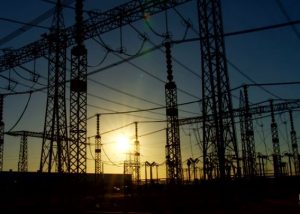![Power [Electricity] Lines](https://unicpress.com/wp-content/uploads/2015/09/Power-Electricity-Lines.jpg)
ABUJA & LAGOS, Federal Republic of Nigeria. Six electricity generating plants have been shut down across the country, causing worry that the relative stability in power supply in recent times may be short-lived.
It was gathered that the situation has made power generation to fall uncontrollably to about 4,652 Mega Watts (MW). The development came as Nigerian National Petroleum Corporation (NNPC) vowed to eradicate crude oil theft in eight months in the country.
The daily power generation report issued by the Transmission Company of Nigeria (TCN) and obtained by The Guardian yesterday showed that only 16 of the 25 existing power generating plants in the country are currently running.
Besides the fact that most of the power plants are running in partial capacities, it was learnt that the affected six facilities were shut down due to either gas shortage, under rehabilitation, technical damage or fire outbreak.
The affected plants are Afam IV-V, A.E.S power, ASCO, Omoku, Trans Amadi, and Rivers Independent Power Plant. Besides, Egbin power generation dropped to 693MW due to the shutdown of ST 1for maintenance, and high frequency occasioned by the distribution company’s inability to pick its load allocation.
Generation from Ibom Power also reduced to 53.8MW due to guide vane problem, GT 2 maintenance and inability of Port Harcourt Disco to pick load allocation. Geregu was reduced to 188MW due to gas constraints and spinning reserve.
Omoku was completely down due to collapsed towers on Omoku/PH mains 132kV transmission line. Two units from Trans Amadi (GT2 and 4) were said to have tripped off due to reversed power, while the other two units (GT1 and 3) were faulty.
AES completely lacked gas supply. As the nation’s generation hits 4,652MW, the estimates show that a peak demand of about 14,630 is actually required for Nigeria to enjoy stable supply.
This, according to the report, shows that the country is having a shortfall of about 9,978MW to meet national demand. Meanwhile, the Chairman, Nigerian Electricity Regulatory Commission (NERC), Sam Amadi, has assured that electricity generation would hit 6000MW by December.
Amadi said the commission was working relentlessly to ensure that generation and transmission companies improve on their services by providing adequate power to Nigerians.
He linked the problem of electricity in Nigeria to scarcity of gas supply. “We saw in June how generation capacity went as low as 2000MW, but later went up to 4.700MW. “We set a benchmark of at least 5000MW, but today we are at 5000 MW or more, hoping to reach 6000MW before December,” he said.
To actualise its plans to end oil theft, the NNPC has introduced fresh vista to the fight against menace and pipeline vandalism in the country. Nigeria is said to be losing over 200,000 barrels of crude oil per day to theft and pipeline vandalism.
Specifically, a recent report by the Nigeria Extractive Industries Transparency Initiative (NEITI) said the nation lost over 136 million barrels of crude oil estimated at $10.9 billion through pilfering and sabotage from 2009 to 2011.
NEITI added that Shell, Eni and Chevron recorded a loss of about 160 million barrels of crude oil with an export value of $13.7 billion between 2009 and 2012.
NNPC said in a statement signed by its Group General Manager, Group Public Affairs Division, Ohi Alegbe, that it is working towards deployment of drones across the nation’s territorial waters to monitor the inward and outward movement of oil bearing vessels.
According to the Group Managing Director of NNPC, Dr. Ibe Kachikwu, the corporation is working on a range of far-reaching options designed to end the ugly episodes of crude and petroleum products theft within the next eight months. “We are launching an armada of approaches which will include incorporation of drones to check movements of vessels within our territorial waters.
We are looking at the current logistical nightmares of changing staffing at the loading bay of crude oil export terminals virtually every 90 days.
We are trying to equip the navy sufficiently though they are very well equipped in terms of skill set but not in terms of arsenal for patrols within the maritime area,” he said.
On the issue of pipeline protection, the GMD explained that though the corporation is working assiduously with the law enforcement agencies to increase the presence of military personnel in the area, the ultimate security for the critical oil and gas assets lies squarely with the host communities. “The best security for these pipelines lies with the communities.
We are trying to create enough incentives for them to see these pipelines as their own,” he added. Lamenting the impact of oil theft on the smooth operations of the nation’s refineries, the NNPC boss warned that if left unchecked, the menace could invariably make it impossible for the NNPC to operate the refineries. “Most of our product pipelines are ruptured and attacked frequently.
For instance, between June 2014 and June 2015, we recorded about 3, 500 to 4,000 attempts at the various products pipelines across the country.
In addition to that, the pipelines that are supposed to convey crude to the refineries are perpetually hacked, he said. Kachikwu noted that the resort to the use of marine vessels to convey crude to the refineries is coming at heavy cost. “What this means is that no matter what we do with the refineries today, unless that is solved, we really are going nowhere, we cannot operate the refineries.”
He explained that beyond the loss of crude and products, the incidents of oil theft have also claimed a huge number of human lives. He informed that in the last three years, a total of 350 persons including NNPC staff, police officers and community members have been killed as a result of activities of oil thieves.


![Power [Electricity] Lines](https://unicpress.com/wp-content/uploads/2015/08/Power-Electricity-Lines-300x158.jpg)
![Power [electricity] supply](https://unicpress.com/wp-content/uploads/2016/09/Power-electricity-supply-300x152.jpg)